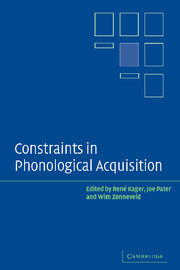Book contents
- Frontmatter
- Contents
- List of contributors
- Abbreviations
- Preface
- 1 Introduction: constraints in phonological acquisition
- 2 Saving the baby: making sure that old data survive new theories
- 3 Markedness and faithfulness constraints in child phonology
- 4 Input elaboration, head faithfulness, and evidence for representation in the acquisition of left-edge clusters in West Germanic
- 5 Phonological acquisition in Optimality Theory: the early stages
- 6 Syllable types in cross-linguistic and developmental grammars
- 7 Bridging the gap between receptive and productive development with minimally violable constraints
- 8 Learning phonotactic distributions
- 9 Emergence of Universal Grammar in foreign word adaptations
- 10 The initial and final states: theoretical implications and experimental explorations of Richness of the Base
- 11 Child word stress competence: an experimental approach
- Index of subjects
- Index of names
Preface
Published online by Cambridge University Press: 22 September 2009
- Frontmatter
- Contents
- List of contributors
- Abbreviations
- Preface
- 1 Introduction: constraints in phonological acquisition
- 2 Saving the baby: making sure that old data survive new theories
- 3 Markedness and faithfulness constraints in child phonology
- 4 Input elaboration, head faithfulness, and evidence for representation in the acquisition of left-edge clusters in West Germanic
- 5 Phonological acquisition in Optimality Theory: the early stages
- 6 Syllable types in cross-linguistic and developmental grammars
- 7 Bridging the gap between receptive and productive development with minimally violable constraints
- 8 Learning phonotactic distributions
- 9 Emergence of Universal Grammar in foreign word adaptations
- 10 The initial and final states: theoretical implications and experimental explorations of Richness of the Base
- 11 Child word stress competence: an experimental approach
- Index of subjects
- Index of names
Summary
In current linguistics the progress made in the study of language acquisition seems to be equalled in few other areas of investigation. The goal of this collection of papers is to present an illustration of this progress, in phonology, in which – building on mid-twentieth-century revolutionary insights (Roman Jakobson, Noam Chomsky, and Morris Halle) – advances at the turn of the millennium are rapid, and exceptionally promising. The editors feel thrilled to present this volume, which contains contributions by internationally leading investigators in the field. They provide broad (but – luckily – opinionated) surveys of general issues from which also the relatively uninitiated reader may obtain an idea of the state of the art, and others give an in-depth analysis of current issues. One will find both first and second language data represented here, discussed from theoretical and empirical angles (in fact, always in combination with one another). The roots of this collection lie in a Workshop in Phonological Acquisition Research (the ‘Third Biannual Utrecht Phonology Workshop’) organised by the editors in June 1998 at the UiL-OTS, the Research Department for Language and Speech of Utrecht University (whose financial and organisational support we gratefully acknowledge). The volume obtained its present shape, however, principally through the addition of papers solicited by invitation, and we express our gratitude to the authors for reacting to our requests in the enthusiastic and generous way they did. Invaluable editorial assistance was provided by Brigit van der Pas, to whom we are also extremely grateful.
Information
- Type
- Chapter
- Information
- Constraints in Phonological Acquisition , pp. ix - xPublisher: Cambridge University PressPrint publication year: 2004
